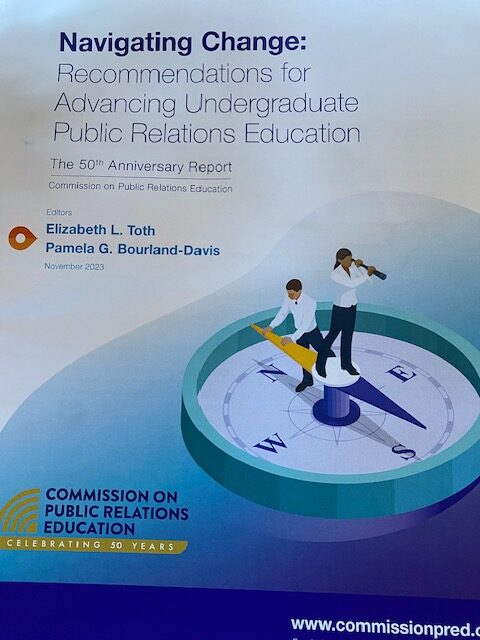Ever wonder what skills we might need (that we don’t already have), or what we need to brush up on in order to stay competitive in the PR profession?
If your answer is “yes”, you’re not alone. Educators who are entrusted with teaching public relations students the strategies, theories, skills, tools and techniques they will need to be successful when they graduate ask themselves this question daily.
In honor of its 50-year anniversary, the Commission on PR Education (CPRE) recently published its Signature Report entitled “Navigating Change: Recommendations for Advancing Undergraduate PR Education.” The report highlights 7 areas that practitioners and educators consider critical for students to master – and they provide insights into the areas of our practice that practitioners might want to revisit (if not learn about from scratch!).
The study, conducted every 5-6 years, was a two-year effort involving more than 60 PR educators and practitioners. It began with multiple focus groups to generate topics to be addressed. The consensus was crowdsourced, then converted into a quantitative survey to obtain benchmark perceptions on each topic.
Areas of Focus For Students and Practitioners:
- Prepare For The Future PR Workplace: Educators and practitioners need to work together to develop experiential learning opportunities and identify “real life” challenges in their case studies.
- Essential KSAs (Knowledge, Skills and Abilities) and the “Six Course Standard”: A PR Ethics course should be required alongside Principles, Research, Writing, Campaigns/Case Studies and Internships.
- Critical Strategic Thinking: Knowing how to analyze information and apply strategic thinking to determine creative direction — as both are required when developing communication strategy.
- Data Insights and Strategy: Understanding the basics of analytic metrics and data analysis. PR work depends on developing data insights, analyzing their meaning, and communicating them effectively to managers and clients.
- Ethics: Understanding and applying ethical principles to critical thinking, strategic planning, and one’s personal Code of Ethics.
- Diversity, Equity, Inclusion (DEI): Successful organizational practices in DEI center on appreciating human differences, treating all people fairly, and ensuring that all individuals and communities feel valued. (This data was collected prior to DEI’s recent role as a whipping boy in political discussions. However, I think it would have been seen as even more valued as a result!)
- PR as a Driver of Social Change – Being Courageous: The study identified PR’s role as a social and cultural practice that generates public engagement and discourse around issues that shape society. Practitioners should be prepared to do this work in the organizations they serve.
To learn more about the study’s findings, visit www.Commissionpred.org for the Executive Summary and Full Report.
Please remember, these students could very well be your next hire … or in a few years … competition for the position you are seeking. Knowing what they know is imperative for us all.
Stacey Smith, APR, Fellow PRSA is Senior Counsel & Partner at Jackson Jackson & Wagner, a Behavioral Public Relations and Management Consulting practice based on the Seacoast of NH. She just completed her term as Immediate Past President of the Commission and encourages all of us to find ways to serve the PR profession wherever possible!

